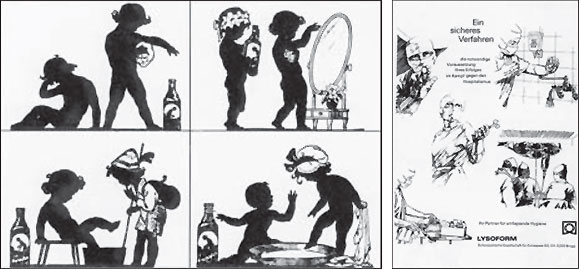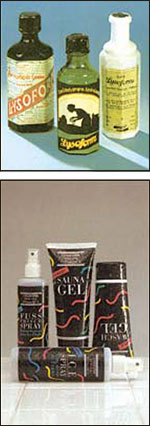Lysoform – The Story of a Company
- Lysoform - a house at a glance
-
Lysoform – famous world-wide since 1900 as one of the major brand names for disinfectants.
Lysoform – a trademark for disinfectants and a neologism which has been in the dictionary for decades as a synonym for disinfection.
Lysoform – this means hygiene, cleanliness and health in general.
Lysoform – behind this name stands a firm of dedicated people full of ideas about the diverse aspects of hygiene. In order that you may become better acquainted with the people and ideas which have shaped Lysoform, „The Story of a Company“ introduces the firm to you – with a look back at a long tradition and a look forward into a successful future.

The head office in Berlin - Tradition and Progress
-
Since its foundation as a chemical-pharmaceutical enterprise, Lysoform has specialised in the area of disinfectants and antiseptics and in the related fields of ‚healing cosmetics‘ and hygienic cleaning.
The producer and distributor of such pharmaceuticals bears a special responsibility for these products, because the consumer must feel certain that under practical conditions the disinfectant is as efficient as can be expected on the basis of the manufacturer’s information.
While the effectiveness of ordinary cleansers is easily inspected, controlling the efficiency of disinfection still demands extensive laboratory work. Moreover, considerable experience with this kind of testing is required.

Tradition and modernity: We have the solution! The confidence placed in a manufacturer like Lysoform over decades obliges him to provide customers with comprehensive scientific and technical advice and training: when and where to disinfect or, conversely, not to disinfect; how to measure out the correct doses; how to correct a given product so as to reduce possible negative side effects for people, animals, objects or the environment. After all, disinfection and antisepsis mean either the destruction of microorganisms, which is to kill or inhibit life, or the deactivation of a virus.
Through its technical customers service, Lysoform attempts to solve customers‘ problems on the spot, for example, by selecting the appropriate disinfection treatment for surfaces or by repairing and servicing dosing devices and equipment. Lysoform does not construct these appliances; however, it does cooperate with leading manufacturers as an advisor in order to be able to recommend the best possible solution for each customer.
Lysoform’s philosophy is committed to ethical standards – drawing from 120 years of tradition. The company has seen and still sees its task as developing useful and appropriate solutions for problems at least for the long term benefit of customers. There has never been any interest in achieving dubious short term success by following scientifically unfounded, tendentious fashions.
Environmental and health concerns had already become a priority for Lysoform well before most people concerned themselves with these issues. The deciding criteria are the benefits that given preparations can provide:
Ethical standards always take priority over price competition.
The company has always engaged itself not to sell its products by means of instilling fear. It has also always indicated where use and application of disinfectants are unnecessary. This philosophy has made it possible for Lysoform, being an independent family-owned enterprise since 1900 – now in the fourth generation – to maintain a strong presence on the market.
- Milestones of Product Development
-
The following examples, taken from the areas of disinfection, antiseptic, ‚healing-cosmetics‘ and hygienic cleaning make clear the creativity and vitality of the company Lysoform:
Lysoform: First aldehyde-containing antiseptic
Pfefferminz-Lysoform: First disinfectant for the throat
H5-Bio-Creme: First skin cream with pH level 5.5
H5-Hände-Desinfiziens: First alcohol-containing washing disinfectant
Lysoformin: First disinfectant with a pH level below 7 containing aldehydes
Aldowax: First disinfecting wax preparation for floors – cleaning and preserving in one operation
Wasa-Foam: First non-aerosol cleaning-and-caring foam for application in nursing elderly people
Lysoform-Sauna-Gel: First body gel to support sauna effects

Old and new preparations - The Origins of Disinfectants
-
The second half of the nineteenth century was a period of major discoveries in the field of medical microbiology. Names like Robert Koch and Louis Pasteur are still well known today. At that time, scientific studies were carried out to determine the efficiency of certain chemical substances as well as that of physical effects (e.g. heat) in killing micro-organisms. This led to the development of the first disinfectants:
Sublimate (mercuric chloride), chloride of lime, alcohol and phenolic tar oils.

Dr. Hans Rosemann By 1892 the microbicidal properties of formaldehyde were known. Using this knowledge, the pharmacist Dr. Hans Rosemann, working together with the chemist Dr. Alfred Stephan, developed a disinfectant which improved all prior preparations in terms of efficiency, toxicity and even smell. It was a mixture of a liquid soap with formaldehyde. Even the cleansing effect was excellent.
In the year 1900 the German Patent Office issued a patent for this new disinfectant. In order to utilise this patent, Dr. Rosemann founded a company that same year, which he named after the patented product, Lysoform. In 1913 he changed the name to Lysoform Dr. Hans Rosemann.
The new preparation was widely distributed within a short period of time. In hospitals and medical practice, as well as private nursing – that is among professionals and non-professionals alike – Lysoform rapidly became synonymous with disinfectants. Moreover, this was not only in Germany, but throughout Europe, in North and South America and in parts of Asia, Africa and Australia.
- The First World War and the Post-War Period
-
World War I and the defeat of the German Empire left its marks on the development of Lysoform. As Dr. Hans Rosemann was killed in the war in 1914, his daughter inherited the enterprise. Her husband, Dr. Walter Heilgendorff took over the management in 1917. Until the outbreak of World War II in 1939 business had stabilised but was mainly restricted to Germany.
- The Second World War and a New Start
-
During the war and in the early post-war years – due to West Berlin’s unique circumstances (such as the Berlin Blockade of 1948) – the production was drastically reduced and at times totally discontinued. Lysoform had lost its market shares in middle and eastern Germany.
In November 1945, Dr Walter Heilgendorff died and left the company to his two daughters. About five years later, their husbands Heinz Kuckei and Dr. Johannes Rödger jointly took over the management of Lysoform.
During the post-war years the habits of the population changed considerably: while private home nursing was more common before the Second World War II, sick people were now admitted to hospital even for less serious illnesses. Moreover, consciousness of many people, even professionals, changed due to the widened use of antibiotics: they did not feel threatened by infections any more, and that caused a decrease in the understanding of hygiene.
Lysoform therefore had to find a new way. In just a few years a successful organisation for the direct distribution to hospitals and other medical establishments was set up.
As the existing premises did not allow for the expansion of production, the property at Kaiser-Wilhelm-Strasse 133 in Berlin-Lankwitz was purchased. In 1966 the company was able to move into a new building. Already by 1975 – for the 75th Anniversary – the building was extended to over twice its original size. At this location Lysoform now houses, in addition to production, quality control laboratories and administration, its own research and development laboratories.
With the projects initiated by Dr Rödger, Lysoform gave a new impetus to the research of disinfectants and achieved for itself a leading scientific role in the field, for example with the impression procedure for testing the efficiency of disinfectants. Lysoform developed products which, due to their activity as well as their other qualities, belong to the finest products of that type in the German and international markets.
Lysoform® – the first preparation of the company Lysoform – is still today an up-to-date product. Following scientific and technical progress, Lysoform’s product line keeps up to modern standards – always taking advantage of long standing experience.
As Dr. Johannes Rödger died in 1984 and Heinz Kuckei retired from business in 1988, the company is now directed by Dr. Hans-Joachim Rödger (†), medical microbiologist and epidemiologist, the great-grandson of the founder.
Germany’s reunification gave access again to markets once lost – and reactivation of contacts and sales were achieved successfully and within short time by the enthusiastic efforts of the entire staff of Lysoform. This growth made it necessary to reorganise internal structures, but also to invest in personnel, machinery and storage commodities (eg high shelf units).
Certification in accordance with DIN EN ISO 9001 for quality management and DIN EN ISO 14001 for ecological management – under special consideration of EU regulations for medical devices – demonstrate that the company Lysoform successfully meets the actual standards. At the same time this is an encouragement to further increase the quality level and the understanding of environmental relations.
Since the beginning of the 1990s the company Lysoform represented by Dr. H.-J. Rödger (†) and Dr. J. Schwemmer has substantially participated in initiating and conceiving standards for testing the efficiency of chemical disinfectants and antiseptics on European level (CEN).
- Foreign Markets
-
Berlin-based Lysoform lost many of its foreign markets due to the two world wars. Nonetheless, the company has again achieved representation in a good number of foreign countries with particular products in the Netherlands, Belgium, Austria, Greece, Spain, Poland, Russia, Belorussia, Estonia, Latvia, Lithuania, Ukraine, Moldova, Romania, Bulgaria, Hungary, Georgia, Azerbaijan, Armenia, China, Philippines, Turkey, Egypt, Syria, India as well as in other countries.
Whilst the Lysoform Schweizerische Gesellschaft für Antisepsie AG situated in Brugg/Windisch is exclusively active on the Swiss market.

Laboratory In addition there exist further independently producing Lysoform companies with individual product lines in countries like Austria, Italy, Spain, Argentina and Brazil. There exists a friendly interchange of information and experience with these companies.
- "Scientist, Businessman and Artist"
-
Many members of the staff of the company Lysoform are „scientists, businessmen and artists“ alike because of their particular qualifications. That means that freedom and creativity of the artist go together with the sense of responsibility and intellectual curiosity of the scientist, whereby economical aspects and commercial reliability in serving customers set the limits.
A highly motivated and qualified team, therefore, can be found in all departments. More than 80 employees are committed to Lysoform and thus to you, our respected business friends.
Every member of the staff is an expert in his or her field and a partner in the enterprise – so that serious work becomes rewarding and leads to effective results.